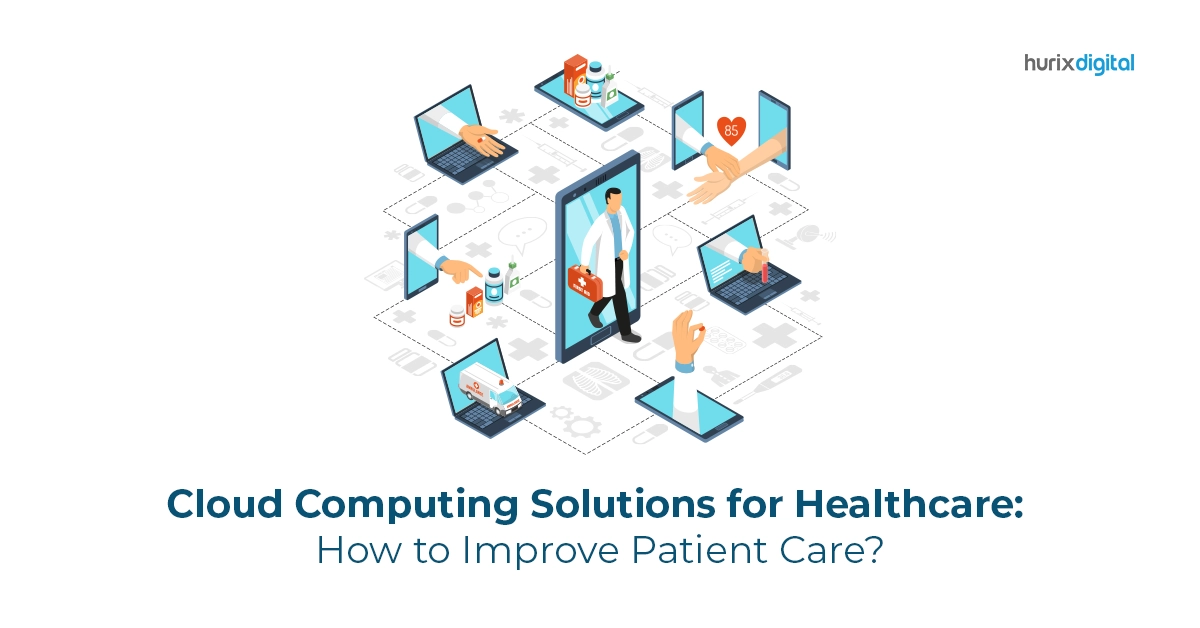
Cloud Computing Solutions for Healthcare: How to Improve Patient Care?
Summarize with:
Balancing the demands of a bustling healthcare career, where you manage critical patient data alongside life-saving duties, can be daunting. You surely need a reliable ally to lighten your load.
Healthcare cloud services empower you with efficiency, security, and accessibility at your fingertips. Cloud computing solutions are an invisible force vital to the hospital’s functioning amid the army of life-saving equipment.
The healthcare cloud computing market is estimated to reach a staggering $89.4 billion by 2027. With the increasing adoption of cloud-based healthcare, there cannot be a better time to unmask the transformative power of this innovative technology.
In this article, we delve deeper into cloud computing in healthcare and how it is revolutionizing the domain. Let’s get started!
Table of Contents:
- What are Cloud Computing Solutions in Healthcare?
- Top 6 Benefits of Cloud Computing in Healthcare
- 5 Real-World Applications of Cloud Computing in Healthcare
- Leveraging Cloud Technology in Healthcare
What are Cloud Computing Solutions in Healthcare?
In healthcare, cloud computing involves deploying internet-based remote servers for storing, managing, and processing medical data. This method offers a flexible approach, allowing stakeholders to access data from remote servers.
Simply put, cloud computing enables healthcare providers to use a massive amount of data securely from anywhere and at any time. It also allows for the secure sharing of electronic health records (EHRs), imaging, and other critical information.
This helps providers streamline operations, reduce infrastructure costs, and automate various processes while delivering personalized and high-quality patient care.
Furthermore, cloud-based data analysis helps extract information that would otherwise remain hidden. Cloud computing enables the operation of vital applications, analysis, and extraction of information using the natural language processing capabilities of machine learning.
The technology can extract key data from piles of unstructured information, including lab and physician notes.
Therefore, by leveraging cloud computing, you can enhance the overall quality of patient care through improved data accessibility and analysis.
Top 6 Benefits of Cloud Computing in Healthcare
Although some healthcare systems may hesitate to transition to the cloud, it’s crucial to recognize the benefits for patients. Cloud-based solutions not only enhance patient care but also offer substantial advantages for your organization.
Let’s explore the various benefits of cloud computing in healthcare.
1. Scalability
Healthcare cloud solutions are entirely scalable and can expand in unison with your organization. A simple call to your service provider is all that’s required to expand your data storage capacity to meet your growing needs.
The technology ensures you meet fluctuating demands efficiently without compromising performance or incurring unnecessary costs. This scalability fosters agility and adaptability, which are crucial for dynamic healthcare environments.
2. Cost Efficiency
Embracing cloud solutions in healthcare enables you to reduce upfront infrastructure costs substantially. With pay-as-you-go models, you can optimize resource allocation based on demand. This makes healthcare services more cost-effective and accessible for providers and patients, enhancing overall healthcare affordability.
3. Data Security
One of the most critical aspects of cloud computing in healthcare is the implementation of robust security measures. You can safeguard sensitive patient data from breaches by leveraging advanced encryption techniques and stringent access controls. This also helps ensure compliance with regulatory standards and builds trust among patients and stakeholders.
4. Improved Accessibility
Cloud computing facilitates real-time data sharing and seamless collaboration among healthcare professionals. This improved accessibility to critical information allows for quicker and more informed decision-making. As a result, you can deliver timely and efficient healthcare services, which ultimately results in enhanced patient care and satisfaction.
5. Advanced Analytics
Integrating cloud technology in healthcare empowers you to harness the power of advanced analytics. You can derive actionable insights and personalize patient care by processing and analyzing vast amounts of data. This also helps make informed decisions based on trends and patterns, leading to improved outcomes and proactive healthcare management.
6. Enhanced Patient Experience
Cloud computing increases patient engagement in medical services by granting them real-time access to test results, doctor’s notes, and medical data. The technology also prevents patients from being dragged into unnecessary testing and overprescription, as they can check these details in their medical records.
5 Real-World Applications of Cloud Computing in Healthcare
The practical applications of cloud computing in healthcare extend far beyond theory. Exploring these real-world instances can unveil the tangible impact of this technology on patient care and operational efficiency.
1. Telemedicine
Cloud computing enables seamless telemedicine services, allowing you to conduct remote consultations. You can now monitor patients in real-time and provide healthcare services regardless of geographic constraints.
This promotes accessibility, particularly for underserved communities, and facilitates continuous care management. In other words, patients can receive timely medical attention from the comfort of their homes.
2. Electronic Health Records (EHR)
By leveraging cloud-based solutions for managing electronic health records, you can streamline data storage, accessibility, and updates. The technology ensures up-to-date and accurate information is readily available to healthcare providers, regardless of their location. This enhances care coordination, reduces errors, and improves overall patient care quality and continuity.
3. Healthcare IoT
Integrating cloud technology with healthcare Internet of Things (IoT) devices enables continuous patient monitoring, data collection, and analysis. This facilitates personalized and proactive healthcare management, empowering you to deliver timely interventions. It also helps enhance patient engagement and health outcomes through remote monitoring and preventive care.
4. Medical Imaging
Cloud-based solutions for medical imaging storage and analysis allow for efficient archiving, retrieval, and sharing of high-resolution medical images. This aids accurate diagnosis, treatment planning, and interdisciplinary collaboration among healthcare professionals.
Quick and easy access to imaging data leads to improved diagnostic accuracy, enhanced treatment efficacy, and better patient care outcomes.
5. Drug Development and Research
In healthcare research, cloud computing fosters secure data sharing and collaboration among researchers globally. This accelerates drug development processes, promotes data-driven research initiatives, and facilitates the analysis of complex healthcare data sets.
It ultimately expedites breakthroughs in medical science and advances the development of novel treatment modalities for various diseases.
Leveraging Cloud Technology in Healthcare
With the integration of cloud computing and healthcare, you can deliver personalized, accessible, and efficient healthcare services, setting a new standard for patient care. Transitioning to the cloud is often not easy, but collaborating with the right company can make all the difference.
If you’re looking for risk-proof cloud computing solutions for healthcare, look no further than Hurix Digital. Our team of seasoned professionals will make your cloud transition hassle-free, allowing your hospital to operate at peak performance. Trust us to handle the transition while you focus on delivering excellent patient care and saving lives.
To learn more about our cloud computing services, schedule a demo today!
Summarize with:

Vice President – Content Transformation at HurixDigital, based in Chennai. With nearly 20 years in digital content, he leads large-scale transformation and accessibility initiatives. A frequent presenter (e.g., London Book Fair 2025), Gokulnath drives AI-powered publishing solutions and inclusive content strategies for global clients
 A Space for Thoughtful
A Space for Thoughtful 